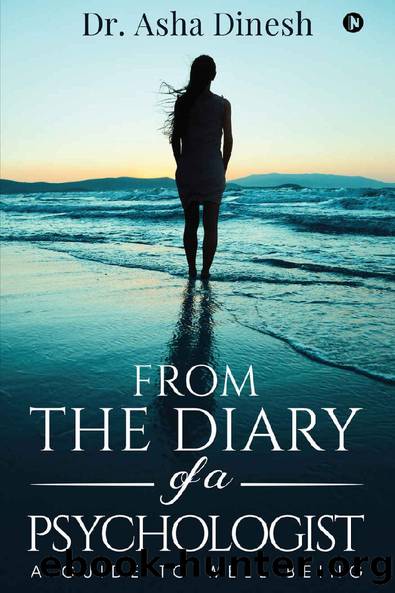From the Diary of a Psychologist : A Guide to well Being by Dr.Asha Dinesh

Author:Dr.Asha Dinesh
Language: eng
Format: epub
Publisher: Notion Press
Published: 2019-01-10T18:30:00+00:00
Here And Now
During heated conversations, or to be precise, during arguments, we observe volatile outbursts from both the parties due to issues that have passed by. Both parties rake up issues of the past, and due to that, the very conversation becomes a blame cycle. Such blame cycles are endless. In those circumstances, the current issue, for which a solution has to be found would suffer because the past-blame cycle becomes very vicious and hard to handle. It becomes self-perpetuating, and the other person is also pulled into the cycle. Instead of such arguments, trekking back to the past, if both parties decide and discuss only the current issue, a worthy solution can be procured.
On the contrary, if even one of the two talks about the past, bigger controversies would occur between both and the very purpose of dialogue, to solve the current issue, would be defeated. Mutually blaming one and other about the past leads to character criticism from both the parties. And we tend to generalize and end up making judgments about the person.
Out mind is trained to think and communicate in terms of what is right and what is wrong with people. When we do this, we end up becoming judgmental and evaluative. This reaction is habitual.
Our initial response to a conflicting situation is more primitive and emotional. That is, we either attack in the form of judgment or we try to sulk. Many times, this habitual and automatic response causes a lot of guilt later. Here, to be conscious about our reactions and wait until we are able to operate with a rational response is very crucial. When we are emotional, our mind is readily able to locate critical and blaming scenarios from the past. Here, we tend to choose words which are more evaluative than factual. In this state of mind, a person generally complains rather than ask for what he needs.
HERE AND NOW communication is a healthy approach to a relationship. It assures greater authenticity, increased understanding, deep connection, and better conflict resolution. It emphasizes, consciously staying in the present and being focused on the issues. This approach shares power with others rather than use it to suppress someone. Here, the communication is clear, empathetic, and in the present.
Here, the needs are clearly specified without being demanding, critical, or judgmental. The emphasis is on consciously staying in the present. It focuses on observations which are specific to time, place, and context. The needs are clearly specified. For example, you never spend time with me. Now, this statement has an element of generalization and is more likely to evoke a defensive reaction. In this statement, the need is not specified clearly. The alternative will be I want you to spend time with me more often. Here, the need is clear, and the context is in the present.
A mother is telling the kid that he is wasting a lot of time watching TV If she opts to quote the immediate facts, hinting to the kid, that he or she has been viewing TV from 11.
Download
This site does not store any files on its server. We only index and link to content provided by other sites. Please contact the content providers to delete copyright contents if any and email us, we'll remove relevant links or contents immediately.
Through Windows of Opportunity : A Neuroaffective Approach to Child Psychotherapy by Marianne Bentzen; Susan Hart(942)
Overcoming ADHD Without Medication : A Guidebook for Parents and Teachers by Children and Natural Psychology Association for Youth; Children The Association for Youth(880)
Out of the Mainstream: Helping the Children of Parents with a Mental Illness by Loshak Rosemary;(876)
Delphi Collected Works of Sigmund Freud (Illustrated) by Sigmund Freud(644)
The Noom Mindset by Noom(589)
The 48 Laws of Mental Power: Overcoming Trauma and Building Mental Strength by Victor O. Carl(548)
The Psychology of Media and Politics by George Comstock & Erica Scharrer(475)
Sigmund Freud by Janet Sayers;(471)
MANIPULATION & MIND CONTROL: The Persuasion Collection: Dark Psychology Secrets, Analyze & Influence People with Nlp. How to learn Reading Friends and Develop Body Language Skills. by ROBERT TOWER(457)
Behold the Monster by Jillian Lauren(436)
It's nobody's fault: new hope and help for difficult children and their parents by Harold Koplewicz(435)
Totem and Taboo: Some Points of Agreement between the Mental Lives of Savages and Neurotics by Sigmund Freud(423)
The Hypnotic Coach: A Conversational Hypnotherapy Tool Kit by Marion Jess(420)
Directions in Technical Writing and Communication by Gould Jay R.;(411)
Mastering Flow: Perform Better, Experience More Joy, and Live a Happier Life by Nils Salzgeber(401)
THE PSYCHOLOGY OF ENTREPRENEURSHIP; New Perspectives by Michael M. Gielnik; Melissa S. Cardon; Michael Frese(383)
Positive Psychology Across the Lifespan; An Existential Perspective by Piers Worth(363)
Mind Hacking Secrets and Unlimited Memory Power: 2 Books in 1: Learn How to Improve Your Memory & Develop Fast, Clear Thinking in 2 Weeks + 42 Brain Training Techniques & Memory Improvement Exercises by Sharp Scott(356)
The Modern Young Man's Guide to Manhood by Wayne Walker(355)
